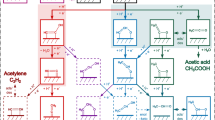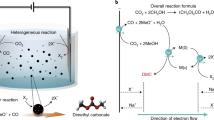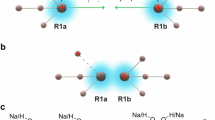Abstract
IN the course of an investigation of the stability of certain ketylic derivatives we have found that carbon monoxide is produced in quantitative yield through the interaction of metallic sodium with certain non-polar carbonates. Thus, sodium reacts readily with a warm xylene solution of diphenyl carbonate with the formation of sodium phenoxide and carbon monoxide, as indicated by the following equation:
This is a preview of subscription content, access via your institution
Access options
Subscribe to this journal
Receive 51 print issues and online access
$199.00 per year
only $3.90 per issue
Buy this article
- Purchase on SpringerLink
- Instant access to full article PDF
Prices may be subject to local taxes which are calculated during checkout
Similar content being viewed by others
Author information
Authors and Affiliations
Rights and permissions
About this article
Cite this article
BOWDEN, S., JOHN, T. Carbon Monoxide from Carbonates. Nature 129, 833 (1932). https://doi.org/10.1038/129833a0
Issue date:
DOI: https://doi.org/10.1038/129833a0



